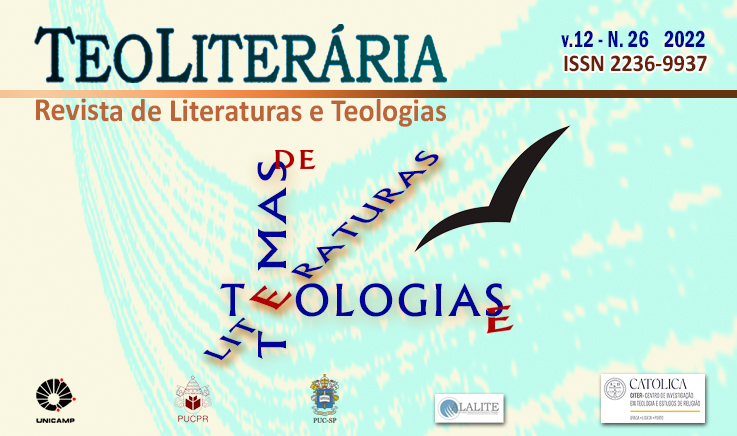As origens teológicas e literárias de Satã em “Paraíso Perdido”, de Milton
DOI :
https://doi.org/10.23925/2236-9937.2022v26p103-121Mots-clés :
Satã, Diabo, John Milton, Paraíso PerdidoRésumé
O diabo de “Paraíso Perdido”, de John Milton (1608-1674), é diferente da figura grotesca que geralmente está associada a Satanás. Ele é humanizado, inteligente, corajoso, um rebelde que passa por conflitos morais. Traços da narrativa e da teologia da rebelião diabólica miltoniana podem ser encontrados na Bíblia, na literatura apocalíptica judaica, na literatura patrística, em textos do cristianismo primitivo, e em textos cristãos medievais e protestantes. Esta pesquisa bibliográfica examina a trajetória literária e teológica que levou ao diabo de Milton, avaliando o quanto desses elementos Milton retém em seu poema, e o quanto ele é original. De acordo com esta pesquisa, Milton não negou a sua herança cultural, mas também não foi apenas um reflexo dela. Ele assumiu o controle da construção de seu personagem, e brindou o mundo com uma obra inesquecível que representa literariamente as transformações no pensamento ocidental da passagem da Idade Média até a Idade Contemporânea.
Références
AGOSTINHO, Santo. A Cidade de Deus, parte I. Petrópolis: Vozes; São Paulo: Federação Agostiniana Brasileira; Bragança Paulista: Editora Universitária São Francisco, 2017.
BAGEHOT, Walter. John Milton. In: HUTTON, Richard Holt (ed.). Literary Studies. V. 1. 2ª ed. London: Longmans, 1879, p. 173-220. Disponível em: <https://bit.ly/3sx9TtS>. Acesso: 09 nov. 2018.
BLOOM, Harold. Anjos caídos. Rio de Janeiro: Objetiva, 2008.
CALVIN, John. The Institutes of the Christian Religion: an introductory textbook on the protestant faith that remains influential in the western world. Seattle: Pacific Publishing, 2011. p. 193. Disponível em: <https://bit.ly/3H4zNJw>. Acesso em: 19 jan. 2020
CAREY, John. Milton’s Satan. In: DANIELSON, Denis (ed.). The Cambridge Companion to Milton. Cambridge: Cambridge University Press, 1989, p. 160-174.
DANIELSON, Dennis R. Milton’s good God: a study in literary theodicy. Cambridge: Cambridge University Press, 1982.
DAVIES, Brian: EVANS, G.R. (eds.). Anselm of Canterbury: the Major Works. New York: Oxford University Press, 1998.
FERNANDES, Fabiano Seixas. Introdução. In: MILTON, John. Paraíso Perdido. Traduzido por António José de Lima Leitão. São Paulo: Martim Claret, 2018, p. 7-16.
FERNANDES, Fabiano Seixas. O Satã de John Milton. In: MAGALHÃES, Antônio Carlos de Melo, et al (orgs.). O demoníaco na literatura. Campina Grande: EDUEPB, 2012, p. 125-137.
JUNG, Viviane Brunhilde. Liberdade para obedecer: uma espiadela nas influências teológicas de John Milton em Paraíso Perdido. Vox Scripturae - Revista Teológica Internacional, São Bento do Sul, v. XXVII, n. 2, (p. 217-251), mai-ago 2019. Disponível em: <https://bit.ly/3swtMBf>. Acesso: 22 jan. 2020.
LANGLAND, William. Piers Plowman - a modern verse translation. Jefferson: McFarland & Company, 2014.
LEWALSKI, Barbara K. Genre. In: CORNS, Thomas (ed.). A Companion to Milton. Oxford: Blackwell Publishing, 2003, p. 3-21.
LEWALSKI, Barbara K. The life of John Milton: a critical biography. Oxford: Blackwell, 2002.
LEWALSKI, Barbara K. Paradise Lost and the Rhetoric of Literary Forms. Princeton: Princeton University Press, 1985.
LINK, Luther. O diabo: a máscara sem rosto. São Paulo: Companhia das Letras, 1998.
MARTINES, Paulo Ricardo. A liberdade em Anselmo de Cantuária. Tese (Doutorado). Campinas: Universidade Estadual de Campinas, Instituto de Filosofia e Ciências Humanas, 2000.
MATHEWS, Justin Lee. Paradise Lost and the Medieval Tradition. Dissertação de Mestrado. Bowling Green: Western Kentucky University, 2008. Disponível em: <http://digitalcommons.wku.edu/theses/28>. Acesso: 08 out. 2018.
MCGRATH, Alister. Christian literature: an anthology. Oxford: Blackwell, 2001.
MCMANUS, Hugh. The Pre-Existent Humanity of Christ in Paradise Lost. In: Studies in Philology, vol. 77, n. 3, p. 271-282, 1980. Disponível em: <https://www.jstor.org/stable/4174044>. Acesso: 07 set. 2018.
MILTON, John. Paraíso Perdido. Traduzido por António José de Lima Leitão. São Paulo: Martim Claret, 2018.
MILTON, John. A Treatise on Christian Doctrine: compiled from the Holy Scriptures alone. Traduzido por Charles R. Sumner. Cambridge: Cambridge University Press, 1825. Disponível em: <https://bit.ly/32zScPC>. Acesso 23 jan. 2018.
MUCHEMBLED, Robert. Uma história do Diabo: séculos XII – XX. Rio de Janeiro: Bom Texto, 2001.
PAGELS, Elaine. The Origin of Satan. New York: Random House, 1995.
PESSOA, Fernando. Páginas de estética e de teoria e crítica literárias. Lisboa: Ática, 1966.
PRAZ, Mario. A Carne, A Morte e o Diabo na Literatura Romântica. Campinas: Unicamp, 1996.
RAJAN, Balachandra. The Problem of Satan. In: DYSON, A. E.; LOVELOCK, Julian (eds.). Paradise Lost: a casebook. Hong Kong: Macmillan, 1973.
ROCHA, Claudecir de Oliveira. Poemas satânicos no Brasil. Dissertação de mestrado. Universidade Federal do Paraná, Curitiba, 2014. Disponível em: <https://bit.ly/3ektuFh>. Acesso em 12 out. 2018.
RUMRICH, John P.; DOBRANSKI, Stephen B. (eds.). Milton and heresy. Cambridge: Cambridge University Press, 1998.
RUMRICH, John P. Milton Unbound: Controversy and Reinterpretation. Cambridge: Cambridge University Press, 1996.
RUSSELL, Jeffrey. Lucifer: the Devil in the Middle Ages. New York: Cornell University Press,1984.
RUSSELL, Jeffrey. Satan, The Early Christian Tradition. Ithaca: Cornell University Press, 1981.
SCHAFF, Philip (ed.). St. Augustin’s City of God and Christian Doctrine. New York: The Christian Literature Publishing Co., 1890. Disponível em: <https://bit.ly/3ekkWhZ>. Acesso: 22 jan. 2020.
SCHÜLER, Arnaldo. Dicionário enciclopédico de teologia. Canoas: Editora ULBRA, 2002.
VATTER, Hannes. The Devil in English Literatute. Bern: Francke Verlag Bern, 1978.
Téléchargements
Publié-e
Comment citer
Numéro
Rubrique
Licence
© TEOLITERARIA - Revista de Literaturas e Teologias 2021

Cette œuvre est sous licence Creative Commons Attribution 4.0 International.
A TeoLiterária – Revista de Literaturas e Teologias é detentora dos direitos autorais de todos os artigos publicados por ela. A reprodução total dos textos em outras publicações, ou para qualquer outro fim, por quaisquer meios, requer autorização por escrito do editor. Reproduções parciais de artigos (resumo, abstract, mais de 500 palavras de texto, tabelas, figuras e outras ilustrações) deverão ter permissão por escrito do editor e dos autores.



